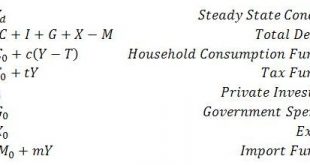The following is mostly intended as background for a possible post (or posts) on quantity effects of a job guarantee in which the standard income-expenditure model is taken as a base. It is desirable to work from as simple a starting point as possible as the exercise can complicate pretty quickly. To minimize unnecessary complications, the base model will be presented in highly abbreviated form. This will not cause anything important to be lost because it is always possible to switch back...
Read More »Job Guarantee as Nominal Price Anchor
I’ve been thinking about the job guarantee as it is envisaged by proponents of Modern Monetary Theory (MMT). My focus has been on various quantity effects of the policy that can be considered using the standard income-expenditure model as a base (for preliminary posts along these lines, see here and here.) Since the income-expenditure model takes the general price level as given, it does not directly shed light on the aspects of a job guarantee that would pertain to price stability. To...
Read More »A Simple Modern Money Tale – Buckwell Island Establishes a Currency
At one time or another many of us have probably pondered questions such as: Where does a national currency come from? How does a currency system basically work? Why might people agree to accept a national currency in the first place? How can we be confident that a national currency won’t collapse and that people will continue to accept it in economic transactions? Can a government ever go broke and leave citizens footing the bill? Can financial affordability even be an issue for...
Read More »A Currency-Issuing Government Spends on its Own Terms
An alternative title to this post could have been, ‘The Interest Rate on Public Debt is a Policy Variable’. This remains true even though, in the neoliberal era, governments usually require themselves to follow various unnecessary rules on how their spending is to be conducted. These rules typically serve no public purpose but may have the effect of misleading the public into believing that somehow a currency issuer can run out of the currency that it alone is empowered to create....
Read More »Dynamics of Output and Demand in a Growing Economy
An earlier post discussed some of the dynamics of output and demand implicit in the income-expenditure model. Attention was confined to a simplified economy that was stationary other than when adjusting to one-off exogenous changes in demand. The present post considers a continually growing economy in which autonomous demand changes over time. The discussion is kept simple by treating all demand other than private consumption as exogenous. The model can be extended to include additional...
Read More »Growth is Good?
Whenever the topic of economic growth is broached, there is a common and understandable reaction along the lines that growth is ecologically unsustainable or socially harmful. Since one of the preoccupations of this blog is demand-led growth, it is perhaps worth pausing to reflect on the appropriateness of the topic. This can be broken down into two parts. Why consider growth as such? And why emphasize the possibility that growth is demand led? Growth as Such Economic growth entails an...
Read More »Easy Money Anytime
I gazed out the eighth-story window of a humble – bashful, even – apartment at crowds of pedestrians on the street below, feeling drawn to those crowds, blissfully lost in their collective thoughts, basking in a sense of universal oneness and kindness toward everyone and everything. I held a specially designated Study Mug to my chest, nestled just so, withholding for a time the pleasure of that first sip. At last I relented, and gave in to sweet temptation, raising the Mug to my lips. Ugh...
Read More »From the Fiction Files – “Easy Money Anytime”
I gazed out the eighth-story window of a humble – bashful, even – apartment at crowds of pedestrians on the street below, feeling drawn to those crowds, blissfully lost in their collective thoughts, basking in a sense of universal oneness and kindness toward everyone and everything. I held a specially designated Study Mug to my chest, nestled just so, withholding for a time the pleasure of that first sip. At last I relented, and gave in to sweet temptation, raising the Mug to my lips. Ugh...
Read More »Disequilibrium Dynamics of Output and Demand
Theoretical studies of output and growth often focus on the behavior of equilibrium output. The usefulness of this approach depends on there being a tendency for actual output to converge on equilibrium output. With such a tendency present, studying the behavior of equilibrium output will tell us something about the behavior of actual output. It is therefore of interest to spell out the process by which an economy in disequilibrium is thought to tend toward equilibrium. A first step is to...
Read More »A Simple Framework for Analyzing a Demand-Led Economy
I have been thinking about a simple depiction of a demand-led economy. Mostly it draws on standard Keynesian macro, Kalecki’s work on cycles and growth, and supermultiplier models developed within the surplus approach. The main focus is on the evolution of a demand-led economy through time. The present post simply sketches the basic framework and provides some context. Perhaps in the future certain aspects can be fleshed out. The Basic Framework The level of ‘real’ economic activity – as...
Read More » Peter Cooper: Heteconomist
Peter Cooper: Heteconomist



